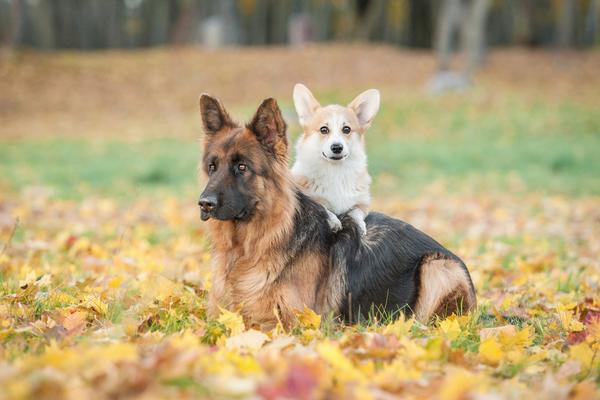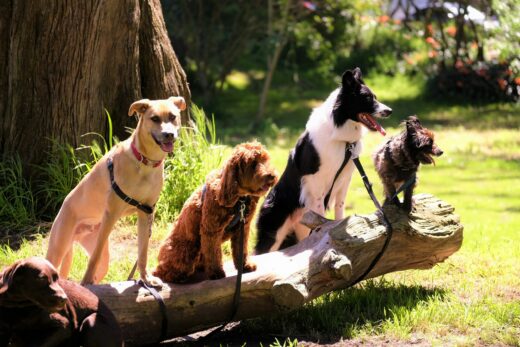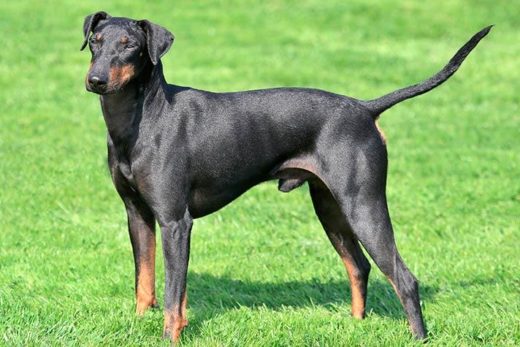
The size range of dogs is pretty astounding – from 2-pound Yorkies to 200-pound Newfoundland doggos; if you’re looking to adopt, you have countless size options. Learn more about the many pros and cons of each dog breed by sizes in our guide below.
So, you’ve decided to adopt a dog. Before you start preparing to bring a dog home, you must first choose the right fit for your life and, quite literally, the right fit for your space.
A dog’s size can affect its need for space, exercise, and even its lifespan. To help you make a better-informed decision, we put together an easy guide that can give you some insight into what comes with a dog of every shape and size.
Follow below and learn about dog breeds by sizes and choose the perfect puppy to adopt!
Dog Size Chart
Before we get into it too deeply, here are the general size categories to help you understand some of the unique terminology used in the puppy world, like toy, teacup, and giant.
Ever wondered how big my dog will be?
- Small Dog Breeds: 2 to 22 lbs
- Teacup: 4 lbs or less
- Miniature: 3 to 12 lbs
- Toy: 5 to 12 lbs
- Medium Breeds: 24 to 57 lbs
- Large Dog Breeds: 59 to 99 lbs
- Giant/Extra-Large: 100 or more pounds
Size Matters for Life Expectancy
You may have heard that smaller dogs live longer than bigger ones. And while that’s sometimes true, it’s not a hard and fast rule.
What’s odd about smaller dogs tending to live longer is that it’s the reverse of many other species we see in nature. Horses outlive hamsters, which far outlast tiny insects, some of which only live a few days. Then, there are always exceptions to the size rule, like the parrot, which often lives longer than 60 years.
Though breeds might look radically different, they’re all a part of the canine species, and in nature, both the enormous and tiny individuals tend to fare the worst within any species.
Small dogs do live longer than larger ones on average. So the smaller the breed you choose, the longer they’ll likely be around.
Take the Great Dane, for example. These massively large dogs have an average lifespan of 6-7 years, while a Chihuahua can live up to 20 long years. The Dogue de Bordeaux and Neopolitan Mastiffs also have unusually short lifespans compared to other smaller dog breeds sizes.
Teacup dogs should last the longest then, right? Nope. These teeny toy dogs result from highly selective breeding, and while they’re mighty cute, they’re unnaturally small. Dogs need a specific body size to develop well, and these runt pups often have underdeveloped systems.
Plus, most teacup breeds came about by repeatedly mating the litter runts to make the breed smaller and smaller. Unfortunately, litter runts tend to have problematic genes and are notoriously unhealthy.
Though larger than teacups, some toy breeds can end up with health issues as they’re still too tiny.
Small-Sized Dogs: Small, Miniature, Toy, and Teacup
These little dogs are so cute and sweet; you’ll want to put them in your pocket. And with some teacup sizes, you literally could, though we don’t recommend it!
We can further break down the group of small types of dogs into the sub-categories seen in our size chart above – teacup being tiny, with miniature and toy close to the same size. Once a dog is over 12 pounds, it’s just considered “small.” As we mentioned before, teacups will have the lowest life expectancy, but some other small breeds live a very long time, so read up on the lifespan of your breed of choice to ensure it’s a time commitment you’re ready to make.
Small dogs make great pets for anyone with a small home and a less active lifestyle, as these dogs have fairly minimal daily exercise needs. They make the best apartment dogs!
These dogs can be as little as two pounds, and as a result, they’re effortless to transport, even for the smallest or weakest hands of children and senior citizens. They’re inexpensive to feed and make great travel buddies.
One thing to beware of with tiny breeds is their fragility – if you live in a loud and crazy household with small children that may step or sit on a little puppy, it can be highly damaging and even fatal.
Small pups tend to yap more than big breeds, but you can train out much of these behaviors if you start at an early age. Training smaller dogs can be a little more complicated than their medium and large breed cousins, but it’s possible!
Pros of Small Dogs
- Perfect size to fit into small homes and apartments
- Easy grooming and cleaning
- Great companion for aging seniors who can’t provide much extra care
- Less expensive to feed as they eat such small portions
- Perfect for taking along on your travels
Cons of Small Dogs
- Small dog breeds tend to be a little more vocal and bark more often
- Training is more complex than in larger and working dog breeds
- They don’t like to exercise much, which may be a downside for active people
Common Small Breeds That Make the Best Pets
- Maltese
- Miniature Dachshund
- Shih Tzu
- Pug
- Chihuahua
- Yorkshire Terrier
- Boston Terrier
- Pomeranian
- Alaskan Klee Kai
Medium-Sized Dogs: The Middle-Man of the Dog World
A medium-sized puppy can make the best pet – they tend to exhibit similar traits as larger dogs but in a more petite, manageable body.
Medium breeds most often tend to be working dogs that traditionally helped farm, hunt, and guard their owner’s property. This long history of work means most medium breeds are highly intelligent and trainable.
Medium dogs tend to weigh around 25 to 60 pounds – it’s an extensive range, which is why we can break down the category even further. Medium-small dogs include standard Dachshunds, French Bulldogs, and Corgis. These dogs are just a smidge bigger than their small breed counterparts.
True medium-sized dogs are Border Collies, Beagles, and other breeds that fall right in the middle of the medium size range.
Medium-large breeds are on the top end of the spectrum and include Shar-Peis, Samoyeds, Standard Poodles, and Airedale Terriers.





